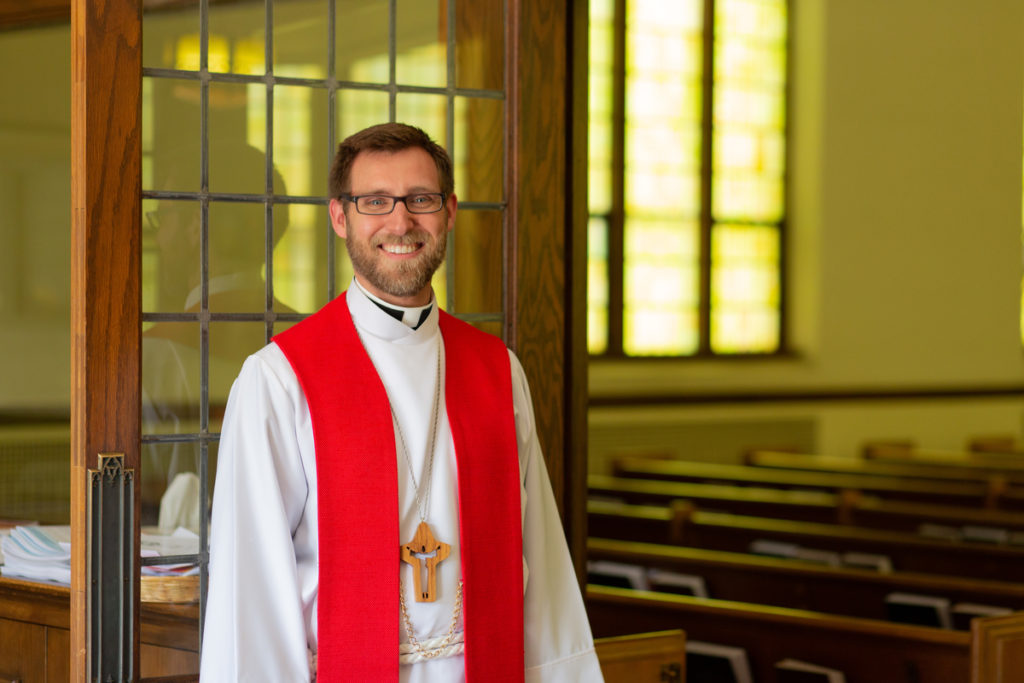In my office hangs my ordination certificate. Across it is emblazoned the name of the ordaining body, the body whose confessional commitments I pledged to uphold on the day I knelt and made my vows. An adult convert to the Christian faith who settled in Lutheranism as the place where I would live out my “mere Christianity” after reading a church library copy of the Augsburg Confession, in the spring of 2016 I had served that denomination in various roles for twenty years.
This spring marks the eighth year since I called my bishop and informed him that I would be serving in a new church body. Even as an adult convert, I know how painful the process is of leaving a church body you have called home; to cause further fracture to the Body of Christ, to disappoint My Lord by ensuring that His prayer that all His disciples might be one as I will become yet one more piece of living evidence of how little the truth of the gospel seems to change the lives of those who believe it, to serve at least in part as another stumbling block for people who—as did I at one point—hold the Christian faith in contempt, was an exquisite pain… I can only imagine how hard it is for a cradle member of a communion to make a similar choice.
In his classic study of what causes massive shifts in a mindset, The Structure of Scientific Revolutions, Thomas Kuhn details how it takes a superabundance of contrary evidence to get people to rethink their fundamental commitments, coining the terms paradigm and paradigm shift. A paradigm shift, when it occurs, is more than a reordering of the furniture in one’s mental office or even changing offices due to corporate restructuring; it amounts to moving out of the building, watching that edifice be razed, and having a new foundation poured upon which you must tentatively build a new place from which to conduct your business.
It is for this reason that I am uncertain whether my decision to leave the ELCA represents a true paradigm shift or not. In the words of a Roman Catholic mentor whose specialty was ecumenical theology, with whom I shared the pain of my process, “You aren’t leaving your church; your church is leaving you.” Though hopefully my thinking has become more refined and nuanced, my fundamental commitments in some ways have not changed since I first knew myself to be a Christian in 1995 and a conscientious son of the Lutheran reformation by early 1996.
Yet once such a choice is made—the choice to leave the home that has nurtured you during your most formative years—once the evidence piles up so high that you cannot ignore it, you begin to rethink many things. Aspects of your identity you thought unassailable become things you question. Commitments you thought unshakable bedrock you begin to recognize as issues of secondary and sometimes tertiary importance… sometimes you come to know them as even detrimental to keeping the most fundamental commitments of all.
Such for me has been the issue of inclusive language in ministry, whether for God or people. The sine qua non of both my undergraduate and graduate education, I have come to question not just its utility, but its very ability to communicate the Word of God, which in turn means its very ability to foster human flourishing… especially for women.
By the time I was being formed in seminary, the use of inclusive language for human beings was a matter of basic politeness and the use of such language for God became mandated as a “justice issue” while I was away from campus on internship. My early training conditioned me to be okay with the former; indeed I had chosen to pursue ordination in the ELCA over the LCMS because of a precommitment to women’s ordination, a commitment I still hold but should not have then, before I could possibly know the Biblical or theological issues at stake.
My conviction in Christianity as a revealed religion prevented me from embracing inclusive language for God. Because of an encounter with a cult in my early twenties, I have a sensitivity to when I am only being told one side of an argument, so the aggressive insistence on the agenda second-cum-third wave feminism and the lack of critical presentation of any other perspective set off a voice in my head: “Danger, Will Robinson… Danger!” The special prominence of this in my liturgics class, where we failed to learn the rudiments of using The Minister’s Desk Edition, made me begin researching the best arguments on the other side.
I was surprised to often find these arguments to be robust rather than reactionary. An honest reader could disagree with these arguments, but not accuse the writer of bad faith or barely disguised animus against women. Particularly compelling was an article by Jesuit Paul Mankowski (who often wrote under the pen name Diogenes) entitled Jesus, Son of Humankind? The Necessary Failure of Inclusive-Language Translations, which I found in a now out-of-print journal. (It is still available on the Touchstone magazine website for subscribers.[1])
There is one issue central to our salvation that inclusive language translations of the Bible obscure—even those translations that only use inclusive language for human beings, like the NRSV—that I have never seen referenced in any scholarly work, so I would like to address it briefly here.
“No one comes to the Father but by me,” says Jesus in one of our most beloved funeral readings (John 14:6), but how exactly does Jesus get us to the Father? “For as many of you as were baptized into Christ have put on Christ,” joyously declares St. Paul. (Galatians 3:27) Elsewhere he adds, “For if we have been united with [Christ] in a death like his, we shall certainly be united with him in a resurrection like his.” (Romans 6:5) We have been united with Jesus.
A robust Sacramental theology teaches us that as regards our eternal inheritance, this means that when the Father regards us, He sees Christ, with whom we have been united, and whom we have donned like a mantle. In other words, He sees not Joe or Sally, merely created in the image of God however pious or penitent, but Jesus, His Son, God Himself, for Whom the entire realm of created reality and uncreated glory is the rightful inheritance.
What this means in contradiction to the polite niceties of post-Christian American cultural religion, each of us is, properly speaking, a child of God only when we share in the sonship of Jesus Christ through Baptism. It is for this reason—not the misogynistic cultural baggage assumed by feminists of whatever wave—that St. Paul in his letters addresses both the male and female objects of his correspondence as “brothers.” We are all brothers because we all through Holy Baptism share in the sonship of Jesus Christ.
Inclusive language translations that render St. Paul’s address as “brothers and sisters” obscure this important salvific truth, esteeming the demands of feminist-defined justice as greater than the actual Biblically depicted mechanism of salvation. Further, it propagates its own fundamentally irreconcilable war between the sexes into the very “beloved community” that is to be the home of “the ministry of reconciliation” (2 Cor 5:18), fomenting disunity in the Body of Christ. Under such conditions, the uniqueness of Christ as the way to God is necessarily veiled and universalism will proliferate to the loss of the evangelistic impulse.
I count this as a very serious way that the very inclusive language that is purported to be a justice issue for women actually does worse than underserve them; it may fail to call them to Christ and so be positively opposed to their ultimate interests.
[1] https://touchstonemag.com/archives//article.php?id=14-08-033-f



























Brett,
As a fellow member of STS, I really appreciated your brave comments on feminism in church language. I was member of the class of 1978 at LTSP and this trend had already begun. I especially welcomed your exegesis on the “sonship” and “brotherhood” that we have in Christ.
After 50 years of living with the “experiment” of women’s ordination and seeing its impact on the LCA/ELCA, I have begun to see a similar soft DEI in the NALC. I am presently trying to open a discussion on the nature of ordination in the Lutheran tradition and how women’s ordination presents some probably insolvable problems for the mission and ministry of the Church catholic. Maybe tradition was on the right path all along until feminism reacted with secular “rights” to the intrinsic nature of men and women being different in eucharistic leadership. I am working on a treatise on this topic and would like to utilize your article.
I recommend and article from the Anglicans in May, First things, which quotes CS Lewis.
https://www.firstthings.com/article/2024/05/mere-priestesses
I also would like to enlist your support in my examination of ordination for men and women.
Sincerely in Christ
M. Henry Pawluk retired, NALC, STS, STM
Thank you for the compliment, Pr. Pawluk, but if my female and/or feminist colleagues have understood me correctly and the NALC is as catholic, orthodox, and evangelical as I hope it is, it did not require a great deal of bravery of me… certainly not as much as I have needed to show at other moments in my calling.
I am not opposed to women’s ordination, but I agree that a fully-fleshed theology of ordination seems to be an Achilles’ heel of Lutheranism, so perhaps I should hold that position contingently pending a more robust theological vision of ordination. In any event, from Marva Dawn to Bp. Carol Hendrix to female colleagues within the STS, I have benefited greatly from the mentoring and collegiality of theologically mature female colleauges and they were some of the most effective opponents of the creeping theological insanity that was apparently evident not only in my own theological education, but according to some of my older colleagues, back to the 1950’s. Some of the female clergy for whom I have great respect have sometimes noted to me privately that if it were demonstrated to them that their status as ordained minsiters were proven unbiblical or detrimental to the mission of Christ’s Church, they would forsake their ordained status, though with tremendous grief and pain. I believe that if Lutheranism is to consider or reconsider its theology of ordination, all of us who are currently ordained must be willing to make the same sacrifice these females colleagues are wiling to make; to renounce our status as clergy in light of what emerges as the more mature Lutheran theology.
It is noteworthy to me that a similar lack of robustness could be said to describe our theology of marriage, another issue where sex/gender is in the limelight. Without soft-selling the inevitable identity confusion into which postmodern individualism plunges us, perhaps part of what we are dealing with is theological weaknesses coming home to roost.
Of course, I am flattered that you consider my work worthy of citation and assent to the same; I look forward to the conversations I hope my article will engender. both by people in agreement and opposed to my view. Without robust conversation, we cannot hope to move forward.